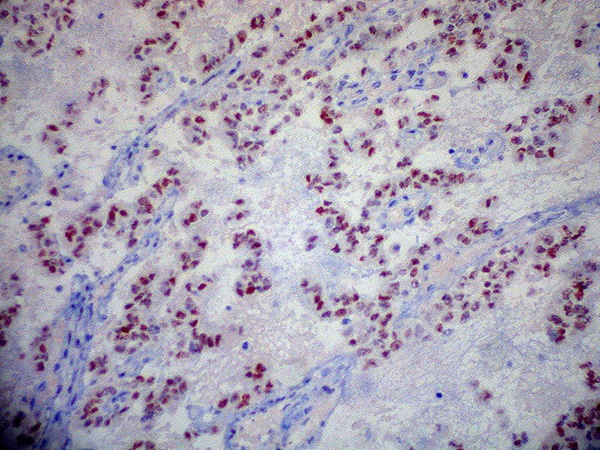New Estrogen Receptor-targeting Therapy for Breast Cancer
The FDA has approved the oral SERD elacestrant to treat certain patients with estrogen receptor-positive breast cancer.
The U.S. Food and Drug Administration (FDA) has approved elacestrant (Orserdu) for the treatment of men and postmenopausal women with estrogen receptor (ER)-positive, HER2-negative breast cancer.
To be eligible, patients’ tumors must harbor a mutation in the gene that encodes ER (ESR1), be locally advanced or metastatic, and have progressed following at least one prior line of endocrine (hormone-targeting) therapy.

Elacestrant is a selective ER degrader (SERD), a type of endocrine therapy that blocks the activity of ER and destabilizes it, helping other enzymes break it down. While many types of endocrine therapies exist for breast cancer, ER mutations commonly arise as a mechanism of resistance to these drugs. SERDs such as elacestrant are effective against both mutated and non-mutated forms of ER. Elacestrant is the first SERD taken by mouth—rather than as an injection—to be approved by the FDA.
The approval was based on results from EMERALD, a phase III, randomized, open-label, multicenter clinical trial that has been previously presented at several AACR meetings. The researchers randomly assigned 478 patients to receive elacestrant or the investigator’s choice of endocrine therapy. Patients were men or postmenopausal women with ER-positive, HER2-negative breast cancer that progressed following one or two prior lines of endocrine therapy, including one line containing a CDK4/6 inhibitor. Of these patients, 228 had tumors with an ESR1 mutation.
Among patients with ESR1 mutations, those treated with elacestrant had a 45 percent lower risk of death or disease progression than those treated with other endocrine therapies. Among patients who did not have ESR1 mutations, those treated with elacestrant had a 14 percent lower risk of death or disease progression than those treated with other endocrine therapies.
According to federal statistics, breast cancer accounted for 15 percent of all new cancer cases in the U.S. in the year 2022, with an estimated 287,850 diagnoses and 43,250 deaths. Approximately 68 percent of breast cancer cases are hormone receptor-positive and HER2-negative.
The FDA rendered its approval on January 27, 2023.
